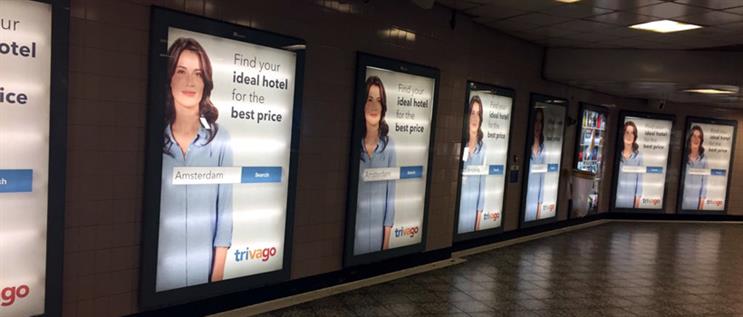Pete Jackson, Exposure Digital
The Trivago ad is undoubtedly stale, it won’t win any awards, and I’m sure the poor designer who was force-fed this execution did not return home that evening with a rejuvenated sense of life purpose and existential glow.
So I understand Sarah Hardcastle’s gripe with the Trivago ad published earlier this week on this site. However, I wonder whether this ad is the nadir of our industry’s current output.
In the context of Kendall Jenner selling world peace and an industry where marketers are falling over themselves trying to patch their brand sticker on to the nearest socio-political issue – it’s almost refreshing to see a campaign that is so unashamedly direct.
Why haven’t they used a nice shot of a hotel, or a luxurious destination, instead of a creepy woman? Maybe the marketer and that poor designer could tell you.
But what we do know is, most "normal" people who walk by this poster will almost certainly not be offended by it to the extent that we advertising folk are.
We see sloppiness, a lack of imagination, and a huge waste of potential for what was probably a hefty media spend.
But most "normal" people will probably just walk by in a daze, subconsciously imbibe the words "Trivago", "Hotel", "Best price" and be on their way.
Not pretty job but job done.
Not the advertising equivalent of of 2010. A bit more Jose Mourinho’s attritional ‘win ugly’ blueprint.
At the end of the day, marketing is about winning. Winning more attention, more customers, and more revenue.
A quick look at the Google Trend graph shows that Trivago has increased its search volumes from the same time last year. Result.
I cannot emphasise enough my agreement with Hardcastle on all her well-made points about this ad.
Creatively, we can do much, much better.
But I do wonder whether an industry that is classically meant to sell stuff, should be chastising campaigns that sell, even if they do so the Mourinho way.
Pete Jackson is the strategy director of Exposure Digital
Chris Arnold, Creative Orchestra
When it comes to polar extremes, quantity vs quality ads, Trivago has opted for quantity without quality. The only ads equally as dull and intense on the tube are Vitabiotics.
Both can argue that their marketing tactics have been successes in terms of growth. But if they had opted for a smarter strategic approach and better creative, could they have done the same job more efficiently, and for a fraction of the media cost? I think 90% of experienced ad execs would say yes.
This is marketing by bulldozer. Blunt force media. All mind, no heart.
But, you can’t knock success – it’s the world’s largest online hotel search site, comparing rates from over one million hotels and more than 250 booking sites worldwide. The site includes over 190 million hotel ratings and 14 million photos, with over 120 million visitors per month.
Since 2015 (since launch in Germany in 2005) Trivago has seen massive growth, coincidently, since it first started using Gabrielle Miller in its ads. But other sites have also seen growth as more of us use the web.

I suspect its success is because Trivago is simply the best product on the market. So maybe the question isn’t why are the ads so dull, but why spend so much on advertising when you are already number one? A more strategic, creative route could probably achieve the same increase in sales for £10m.
But don’t waste your time having that conversation with clients who don’t get the power of creative, you’ll never win the argument. Instead, just take the money, it’s easier.

You may recall that the Wonderbra Hello Boys poster campaign budget was a quarter of its rival. And was voted one of the most iconic ads of all time. Wonderbra’s growth was said to be over 300%. Who was the rival, I hear you say? Precisely.
"The British public have been left feeling freaked out by the Trivago advert," was the opening line of a recent story in The Sun after one commuter counted 38 ads in one station alone.
"Londoners have told how they are being left unnerved," ran the headline in the Evening Standard’s opening words.
I am sure there is an airhead somewhere saying, "look everyone is talking about us". But is anyone saying, "Wow, I must use Trivago instead of the other 12 options." No.
Its highly original proposition is… "Find your ideal hotel at the best price".
Umm, isn’t that the same proposition all travel sites offer? Couldn’t Trivago have come up with a better line than that?
In today’s social media world negative comments can very quickly damage a brand. Could this campaign actually hurt the site long term? No one likes a brand that is too pushy and this campaign has irritated a lot of consumers.
You can’t easily measure negative word of mouth – remember social is just the tip of an iceberg, WOM is 100 times bigger and 10x more influential.
So the strategy may not be dumb, but the ads are and I’m sure the same result could have been achieved for half the media spend with smarter ads.
In the last 15 years, 52% of companies have gone from the top 500, many vanishing completely. The average life of a business used to be 75 years, but in today’s digital world it’s about 15. Trivago is already 12 years old.
Staying at the top has never been harder.
Chris Arnold is the co-founder of Creative Orchestra


